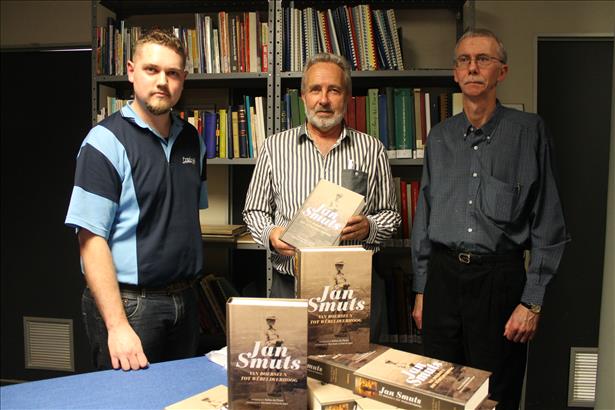Latest News Archive
Please select Category, Year, and then Month to display items
12 January 2024
|
Story Nonsindiswe Qwabe
|
Photo Sonia Small
 Since joining the UFS in 2008, Dr Grey Magaiza has worked extensively on approaches that can foster the socio-economic transformation of societies.
Since joining the UFS in 2008, Dr Grey Magaiza has worked extensively on approaches that can foster the socio-economic transformation of societies.
“The future should be one where communities can decide on their development agenda and futures. That’s the most important for me.” Dr Grey Magaiza, Deputy Director of the Centre for Gender and Africa Studies (CGAS) and Head of the Community Development programme on the Qwaqwa Campus, is passionate about capacitating communities to be agents of change and advancement. His vision for the future emphasises the empowerment of communities to take charge of their development by actively participating in decision making and the implementation of development projects that can improve their lives.
Since joining the UFS in 2008, Dr Magaiza has worked extensively on approaches that can foster the socio-economic transformation of societies. Over the years, he has crafted his research speciality into one that he is most proud of – being an interdisciplinary scientist immersed in the development of communities.
“I’m in a fortunate position of researching what I like. I say ‘fortunate’, because I’ve taken the time to understand what I’m passionate about, which is the overall field of rural livelihoods and livelihood futures – in short, community development. My research starts from an engaged university, understanding the elements that a university must use to enhance transformation and relevance to its immediate community in terms of development.”
One of the ways he has done this is by looking at social entrepreneurship as a development approach for young people in a rural setting. Through workshops with non-profit and civic organisations in Qwaqwa, Dr Magaiza has been helping these organisations to map out their needs and actively meet them through the involvement and support of external role players.
“We understand that communities are part of the national development agenda, but even that national agenda respects community knowledge and intentions and allows communities to shape their identity. A critical enabler of this is community organising. You bring back the capacity in communities to have dialogues on issues affecting them as spaces for engagement, knowledge exchange, and for people to just talk about their way forward.”
By enabling communities to define their development agenda, they can address their specific needs, challenges, and aspirations, he said. “When I look at livelihood futures, it’s quite an exciting aspect of my work – it’s like looking into a fortune tellers’ globe, because you’re not deciding for communities what they should do, but the communities themselves take those decisions.”
Jan Smuts: from country boy to world stage; a reassessment
2017-11-10

At the book discussion of Jan Smuts: van boerseun tot wêreldverhoog;
'n herwaardering, were from the left: Con Robinson, Protea Bookshop;
Prof Kobus du Pisani; and Prof André Wessels from the Department
of History at the UFS.
Photo: Leonie Bolleurs
Prof André Wessels from the Department of History at the University of the Free State (UFS) was one of 20 co-authors of Jan Smuts: van boerseun tot wêreldverhoog; 'n herwaardering – a book compiled under the leadership of the general editor, Prof Kobus du Pisani, from North-West University. This unique history book deals with the different themes in the life of Smuts, rather than describing the events chronologically.
South Africans are almost afraid of their own history nowadays ... and yet another history book is being launched. Does it make sense? Yes, for two reasons.
The monster in the dark
One of the ways to overcome fear is through knowledge. The monster in the dark disappears when one understands that the street lights and tree branches are creating interesting shadows. The more one knows about something, the less scary it becomes.
The Greek Bible
This was possibly also Smuts’s approach. Knowledge was his passion, and even today he is considered as one of the best students of the University of Cambridge. Although very few people really understand his holism theory, Smuts experienced the complex world in a very simple way – as one – not as lots of different pieces functioning independently of each other.
Smuts could have made a success of any of his interest fields – law, botany, literature, and philosophy. However, politics laid three wars on his doorstep. While he is regarded as a militarist by some, he was actually a peacemaker. He played a role in the establishment of the League of Nations, and later the United Nations. Incidentally, he continued to read the Greek Bible while on commando during the Anglo-Boer War.
A colourful character
The second reason for yet another Jan Smuts history book is his fascinating humanness. Time should be spent on colourful characters such as this. It is worthwhile hearing the story of someone who had such a great impact locally and internationally – good or bad.